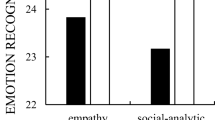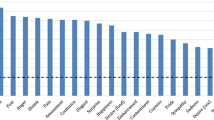Abstract
Empathy is defined as an affect more appropriate to another's situation than to one's own. The paper (i) summarizes different modes of empathic affect arousal; (ii) shows how empathic affect may interact with social-cognitive development, to produce four levels of empathy development; (iii) suggests that causal attributions may transform empathic affect into sympathy, guilt, and empathic anger, which are major moral affects; (iv) discusses how these affects may influence moral judgment and behavior; (v) points up empathic morality's limitations and the need to embed empathy in relevant moral principles; (vi) discusses possible links between empathy and justice principles, with special focus on Rawls; (vii) illustrates the interplay of empathy, moral judgment, and justice; and (viii) suggests that moral principles may become “hot cognitions.”
Similar content being viewed by others
References
Ajer, A. J. (1936).Language, Truth, and Logic Gollancz, London.
Batson, C. D. (1987). Prosocial motivation: Is it ever truly altruistic? In Berkowitz, L. (ed.),Advances in Experimental Social Psychology, Vol. 20, Academic Press, New York, pp. 65–122.
Bishops Pastoral Letter on Catholic Social Teaching and the U.S. Economy: First draft (1984).Origins 14 (22, 23). Second draft (1985).Origins 15 (17).
Damon, W. (1977).The Social World of the Child, Jossey-Bass, San Francisco.
Deutsch, M. (1985).Distributive Justice. A Social Psychological Perspective, Yale University Press, New Haven.
Feshbach, N. D., and Roe, K. (1968). Empathy in six- and seven-year-olds.Child Devel. 39: 133–145.
Gibbs, J. C. (1987). Social processes in delinquency: The need to facilitate empathy as well as sociomoral reasoning. In Kurtines, W. M., and Gewirtz, J. C. (eds.),Moral Development Through Social Interaction, Wiley, New York, pp. 301–321.
Harris, M. B., and Siebel, C. E. (1975). Affect, aggression, and altruism.Devel. Psychol. 11: 623–627.
Hoffman, M. L. (1970). Conscience, personality, and socialization techniques.Hum. Dev. 13: 90–126.
Hoffman, M. L. (1975). Developmental synthesis of affect and cognition and its implications for altruistic motivationDevel. Psychol. 11: 607–622.
Hoffman, M. L. (1978). Empathy, its development and prosocial implications. In Keasey, C. B. (ed.),Nebraska Symposium on Motivation, Vol. 25, University of Nebraska Press, Lincoln, NE, pp. 169–218.
Hoffman, M. L. (1980). Moral development in adolescence. In Adelson, J. (ed.),Handbook of Adolescent Psychology, Wiley, New York, pp. 295–343.
Hoffman, M. L. (1981). Is altruism part of human nature?J. Pers. Soc. Psychol., 40: 121–137.
Hoffman, M. L. (1982a). Measurement of empathy. In Izard, C. (ed.),Measurement of Emotions in Infants and Children, Cambridge University Press, New York, pp. 279–296.
Hoffman, M. L. (1982b). Development of prosocial motivation: Empathy and guilt. In Eisenberg, N. (ed.),Development of Prosocial Behavior, Academic Press, New York, pp. 281–313.
Hoffman, M. L. (1982c). Affect and moral development. In Cicchetti, D. (ed.),New Directions in Child Development, Jossey-Bass, San Francisco, pp. 83–103.
Hoffman, M. L. (1983). Affective and cognitive processes in moral internalization: An information processing approach. In Higgins, E. T., Ruble, D., and Hartup, W. (eds.),Social Cognition and Social Development: A Sociocultural Perspective, Cambridge University Press, New York, pp. 236–274.
Hoffman, M. L. (1984a). Interaction of affect and cognition in empathy. In Izard, C., Kagan, J., and Zajonc, R. (eds.),Emotions, Cognition, and Behavior, Cambridge University Press, New York, pp. 103–131.
Hoffman, M. L. (1984b). Empathy, its limitations, and its role in a comprehensive moral theory. In Gewirtz, J., and Kurtines, W. (eds.),Morality, Moral Development, and Moral Behavior, Wiley, New York, pp. 283–302.
Hoffman, M. L. (1985). Affect, motivation, and cognition. In Higgins, E. T., and Sorrentino, R.M. (eds.),Handbook of Motivation and Cognition: Foundations of Social Behavior, Guilford, New York, pp. 47–80.
Hoffman, M. L. (1989). Empathy and prosocial activism. In Eisenberg, N., Reykowski, J., and Staub, E. (eds.),Social and Moral Values, Erlbaum, Hillsdale, NJ. pp. 65–86.
Hoffman, M. L. (1987). The contribution of empathy to justice and moral judgment. In Eisenberg, N., and Strayer, J. (eds.),Empathy and its Development, Cambridge University Press, New York, pp. 47–80.
Hoffman, M. L., and Saltzetein, H. D. (1967). Parent discipline and the child's moral development.J. Pers. Soc. Psychol., 5: 45–57.
Hume, D. (1957).An Inquiry Concerning the Principle of Morals, Vol. 4, Liberal Arts Press, New York. (Original work published 1751)
Izard, C. E. (1977).Human Emotions Plenum, New York.
Kaplan, E. A. (1988). Women, morality, and social change: A historical perspective. In Eisenberg, N., Reykowski, J., and Staub, E. (eds.),Social and Moral Values, Erlbaum, Hillsdale, pp. 347–361.
Kaplan, L. J. (1977). The basic dialogue and the capacity for empathy. In N. Freedman and S. Grand (Eds.),Communicative and Psychic Structures Plenum, New York.
Keniston, K. (1968).Young Radicals, Hartcourt, Brace, and World, New York.
Klass, T. (1978). Psychological effects of immoral actions: The experimental evidence.Psychol. Bull. 85: 223–251.
Klein, R. (1971). Some factors influencing empathy in six- and seven-year-old children varying in ethnic background (Doctoral dissertation, University of California, Los Angeles, 1970).Diss. Abstr. Int., 31: 3960A. (University Microfilms No. 71-3862)
Krebs, D. L. (1970). Altruism: An examination of the concept and a review of the literature.Psychol. Bull., 73: 258–303.
Lerner, M. J. (1975). The justice motive in social behavior.J. Soc. Issues, 31, No. 3: 1–20.
Lerner, M. J., and Miller, D. T. (1978). Just world research and the attribution process.Psychol. Bull, 81: 1030–1051.
Lifton, R. (1968).Death in Life: Survivors of Hiroshima Random House, New York.
Mill, J. S. (1979).Utilitarianism, Hackett, Cambridge, MA. (Original work published 1861)
Montada, L., Schmitt, M., and Dalbert, C. (1986). Thinking about justice and dealing with one's privileges; A study on existential guilt. In Bierhoff, H. W., Cohen, R., and Greenberg, J. (eds.),Justice in Social Relations, Plenum Press, New York.
Murphy, L. B. (1973).Social Behavior and Child Personality, Columbia University Press, New York.
Orwell, G. (1958).The Road to Wigan Pier Harcourt, Brace, Jovanovitch, New York.
Rashdall, H. (1907).The Theory of Good and Evil, Oxford University Press, New York.
Rawls, J. A. (1971).A Theory of Justice, Belnap Press of Harvard University Press, Cambridge, MA.
Rawls, J. A. (1985). Justice as fairness: Political not metaphysical.Philos. Public Affairs 14: 223–251.
Razran, G. (1971).Mind in Evolution Houghton-Mifflin, Boston.
Scheler, M. (1954).The Nature of Sympathy, Routledge & Kegan Paul, London. (Original work published 1913)
Stephan, W. G., and Brigham, J. C. (1985). Intergroup contact.J. Soc. Issues, 41(3): 1–175.
Stotland, E. (1969). Exploratory investigations of empathy. In Berkowitz, L. (ed.),Advances in Experimental Social Psychology, Vol. 4, Academic Press, New York.
Thompson, R., and Hoffman, M. L., 1980 Empathy and the arousal of guilt in children.Develop. Psychol. 15: 155–156.
Tversky, A., and Kahneman, D. (1973). Availability: a heuristic for judging frequency and probability.Cognit. Psychol., 5:207–232.
Weiner, B. (1985). “Spontaneous” causal thinking.Psychol. Bull., 97: 74–84.
Wellbank, J. H., Snook, D., and Mason, D. T. (1982).John Rawls and His Critics: An Annotated Bibliography, Garland, New York.
Wender, I. (1986). Children's use of justice principles in allocation situations. In Bierhoff, H., Cohen, R., and Greenberg, J. (eds.),Justice in Social Relations, Plenum Press, New York, pp. 249–264.
Wolff, R. P. (1977).Understanding Rawls: A Reconstruction and Critique of a Theory of Justice, Princeton University Press, Princeton, NJ.
Zahn-Waxler, C., Radke-Yarrow, M., and King, R. A. (1979). Childrearing and children's prosocial initiations towards victims of distress.Child Devel., 50: 319–330.
Zanna, M. P., Kiesler, C. A., and Pilkonis, P. A. (1970). Positive and negative affect established by classical conditioning.J. Pers. Psychol. 14: 321–328.




